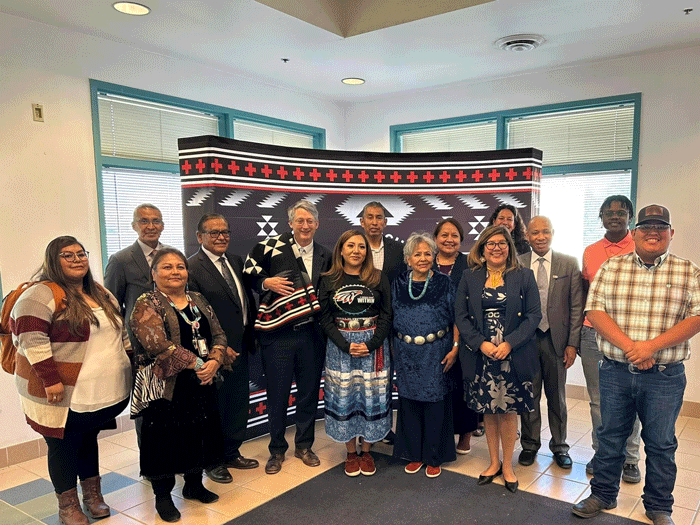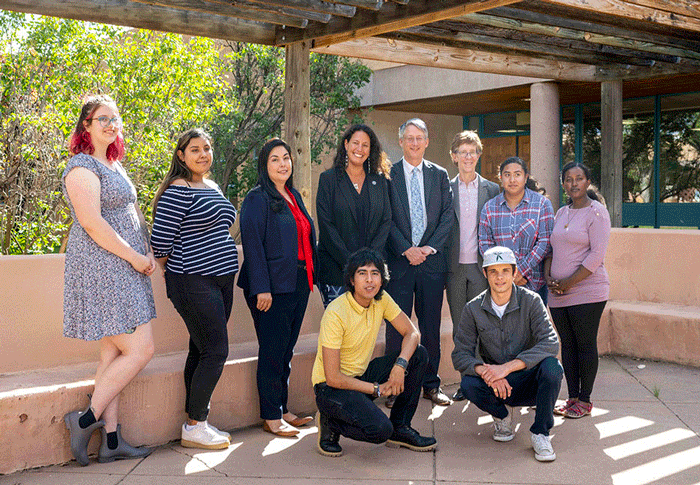New Mexico recognized as a leader in college affordability and student equity.
U.S. Department of Education Under Secretary James Kvaal and Assistant Secretary for the Office of Career, Technical, and Adult Education Amy Lloyd visited two New Mexico college and university campuses Monday as part of a tour highlighting states and schools that are exemplars in serving diverse students and ensuring college access and affordability in the wake of recent Supreme Court decisions.
Department officials first visited Crownpoint on the Navajo Nation, meeting with President Charles Roessel of Diné College followed by a meeting with President Elmer Guy, panel discussions with students, college leaders and faculty, and a tour at Navajo Technical University. They then met with Acting Higher Education Secretary Patricia Trujillo, President Becky Rowley, students and administrators at Santa Fe Community College (SFCC) and toured the campus.
“New Mexico is at the vanguard of how we as a nation can make college affordable and what is possible when higher education isn’t priced out of students’ reach. New Mexico is really ahead of the curve when it comes to some of the challenges facing students today, and the incredible investments are paying off in helping students earn credentials and get jobs,” Under Secretary Kvaal said.
“New Mexico is an exemplar for free college programs that equitably increase opportunity forpeople to pursue postsecondary credentials, which is one of the many reasons why we’re here,” said Assistant Secretary for the Office of Career, Technical, and Adult Education Amy Loyd. “Community colleges like Santa Fe Community College, my alma mater, help students develop a college identity while being responsive to both student and industry needs.”
From the beginning of her administration, Governor Michelle Lujan Grisham has made college access and affordability a priority. New Mexico passed the Opportunity Scholarship Act in 2022, creating the nation’s most inclusive tuition-free college program, which has since benefited 36,000 New Mexicans, the majority of whom are first-generation college goers and students of color. The state has also more than doubled the number of working health care professionals and teachers receiving debt relief through state-funded student loan repayment programs.
The U.S. Department of Education under the Biden-Harris Administration continues to prioritize support for Minority Serving Institutions and addressing the student debt crisis, particularly as U.S. Supreme Court decisions struck down the nearly 50-year precedent of race-conscious admissions in higher education and stopped the administration’s student debt relief program earlier this year.
All 29 public colleges and universities in New Mexico enroll enough Hispanic and Native American students to qualify for the federal designation of Minority Serving Institutions, including four tribal colleges, 24 Hispanic Serving Institutions (HSIs), and four Native American Nontribal Serving
Institutions (NANTSIs). New Mexico also graduates a higher proportion of Hispanic Students than any other state.


“In a moment where college access and affordability are being called into question on a national level, I am proud that New Mexico is leading through example by implementing the country’s most progressive tuition-free college program, dramatically expanding student debt relief, and increasing supports for a wide array of students,” said Acting Higher Education Secretary Patricia Trujillo, Ph.D. “We are honored that the U.S. Department of Education recognizes New Mexico as a state that believes in the power of higher education, and we will continue to do whatever it takes to make it possible for historically underserved students to not only come through the doors to college but walk across the stage on graduation day.”
At SFCC, officials learned about how first-generation, parenting students, and other non-traditional students are being helped through the college’s many student support programs. At least one in every three SFCC students are also parents of young children and are eligible for on-campus childcare through the college's Early Childhood Center of Excellence. SFCC also serves a high proportion of undocumented and DACA students, many of whom have grown up in the Santa Fe area.
“I’m proud of our students, who shared their compelling stories with Under Secretary Kvaal and Assistant Secretary Loyd during their visit to the college,” said SFCC President Becky K. Rowley, Ph.D. “Under Secretary Kvaal was clearly invested in what the students had to say, while SFCC alumna Assistant Secretary Loyd connected with the students’ experiences and challenges. The conversation is sure to have provided informed and thoughtful feedback for our U.S. Department of Education officials to consider.”
Navajo Technical University and Diné College both serve a diverse student body, a majority of whom are Native American and some who come from as far as Chinle, Arizona and other remote communities to attend classes. The federal delegation met with campus leaders and spoke with Navajo Technical University students about their educational experiences and career aspirations.
“When our faculty and students can present their aspirations and dreams to people who can make a difference in either the national or state agenda, then it becomes obvious that young Navajos have all the drive and intelligence to make a difference in the world. They can improve their own lives, offer extraordinary accomplishments to the Navajo people, and join the rest of the country in making the 21st century a time of accomplishment and marvels. They just need the tools higher education can give them and the access and support needed to make those tools useful in their lives,” said Navajo Technical University President Elmer Guy, Ph.D.
“Undersecretary Kvaal’s visit to Diné College underscored the simple but powerful idea that our Navajo students matter and are valued. I look forward to working with both him and Secretary Cardona to make college more accessible for our Native students. Each degree and certificate earned is critical to the Nation building that is so need in Indian country,” said Diné College President Charles Roessel.
Photos from both visits are available here.
For more information about U.S. Department of Education initiatives, visit www.ed.gov.
